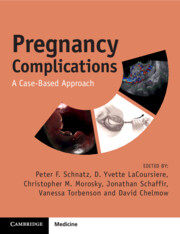Book contents
- Pregnancy Complications
- Pregnancy Complications
- Copyright page
- Contents
- Contributors
- Preface
- Note from the Editor-in-Chief
- Normal Laboratory Values (Conventional Units) []
- Section 1 Antepartum (Early Pregnancy)
- Section 2 Antepartum (Mid-trimester)
- Section 3 Antepartum (Late Pregnancy)
- Section 4 Antepartum (Medical Complications)
- Section 5 Antepartum (Infectious Complications)
- Section 6 Intrapartum/Delivery
- Section 7 Postpartum
- Case 63 A 20-Year-Old with Vaginal Bleeding and Enlarging Fundus Following a Cesarean Delivery
- Case 64 A 25-Year-Old with Post-cesarean Endometritis and Fever Unresponsive to Antibiotics
- Case 65 A 40-Year-Old with Severe Obesity and Painful Right Pedal Edema
- Case 66 A 20-Year-Old 3 Weeks’ Postpartum Presents with Anhedonia and Insomnia
- Case 67 A 40-Year-Old 1 Week after Vaginal Delivery Presents with Shortness of Breath and Orthopnea
- Case 68 A 30-Year-Old with Postural Headache 12 Hours after a Vaginal Delivery with Use of an Epidural
- Case 69 A 35-Year-Old Develops Agitation, Dyspnea, Hypotension, and Cardiovascular Collapse Immediately Postpartum
- Case 70 A 25-Year-Old Presents with Bright Red Vaginal Bleeding 3 Weeks’ Postpartum
- Case 71 A 25-Year-Old Presents Immediately Postpartum with Severe Pubic Pain Limiting Ambulation
- Case 72 A 20-Year-Old with Right Breast Pain and Fever while Breast-Feeding
- Case 73 A 25-Year-Old 6 Hours’ Postpartum with Severe Hypertension, Seizures, and Confusion
- Section 8 Fetal Complications
- Section 9 Placental Complications
- Section 10 Complications of the Cord, Amnion, and Gravid Uterus
- Section 11 Psychosocial Considerations
- Index
- References
Case 66 - A 20-Year-Old 3 Weeks’ Postpartum Presents with Anhedonia and Insomnia
from Section 7 - Postpartum
Published online by Cambridge University Press: 08 April 2025
- Pregnancy Complications
- Pregnancy Complications
- Copyright page
- Contents
- Contributors
- Preface
- Note from the Editor-in-Chief
- Normal Laboratory Values (Conventional Units) []
- Section 1 Antepartum (Early Pregnancy)
- Section 2 Antepartum (Mid-trimester)
- Section 3 Antepartum (Late Pregnancy)
- Section 4 Antepartum (Medical Complications)
- Section 5 Antepartum (Infectious Complications)
- Section 6 Intrapartum/Delivery
- Section 7 Postpartum
- Case 63 A 20-Year-Old with Vaginal Bleeding and Enlarging Fundus Following a Cesarean Delivery
- Case 64 A 25-Year-Old with Post-cesarean Endometritis and Fever Unresponsive to Antibiotics
- Case 65 A 40-Year-Old with Severe Obesity and Painful Right Pedal Edema
- Case 66 A 20-Year-Old 3 Weeks’ Postpartum Presents with Anhedonia and Insomnia
- Case 67 A 40-Year-Old 1 Week after Vaginal Delivery Presents with Shortness of Breath and Orthopnea
- Case 68 A 30-Year-Old with Postural Headache 12 Hours after a Vaginal Delivery with Use of an Epidural
- Case 69 A 35-Year-Old Develops Agitation, Dyspnea, Hypotension, and Cardiovascular Collapse Immediately Postpartum
- Case 70 A 25-Year-Old Presents with Bright Red Vaginal Bleeding 3 Weeks’ Postpartum
- Case 71 A 25-Year-Old Presents Immediately Postpartum with Severe Pubic Pain Limiting Ambulation
- Case 72 A 20-Year-Old with Right Breast Pain and Fever while Breast-Feeding
- Case 73 A 25-Year-Old 6 Hours’ Postpartum with Severe Hypertension, Seizures, and Confusion
- Section 8 Fetal Complications
- Section 9 Placental Complications
- Section 10 Complications of the Cord, Amnion, and Gravid Uterus
- Section 11 Psychosocial Considerations
- Index
- References
Summary
Perinatal mental health disorders affect more than one in five people and obstetrician/gynecologists (Ob/Gyns) are the primary providers for women during the reproductive years when there is increased risk of psychiatric morbidity. Therefore, Ob/Gyns are charged with screening and treating these disorders. Despite the availability of effective strategies for detection and treatment, perinatal mental health disorders are underrecognized and undertreated, and have significant detrimental maternal and infant consequences. Obstetrician/gynecologists should be prepared to counsel patients on the benefits and risks of psycho-pharmacotherapy, initiate psycho-pharmacotherapy, and refer patients to appropriate resources when indicated. A validated screening tool should then be used to monitor for response to treatment or remission of symptoms. Psychotherapy should be considered a first-line treatment for mild-to-moderate perinatal depression and selective serotonin reuptake inhibitors be used as first-line pharmacotherapy for perinatal depression and anxiety. Pharmacotherapy should be individualized based on prior response to therapy and optimal dosing established to avoid undertreatment. The risks associated with inadequately treated mental health conditions as well as the perinatal risks associated with psychopharmacologic agents must be addressed. Furthermore, a discussion about duration of treatment, need for long term follow-up, and considerations for future pregnancy is needed.
- Type
- Chapter
- Information
- Pregnancy ComplicationsA Case-Based Approach, pp. 202 - 204Publisher: Cambridge University PressPrint publication year: 2025

